#ngũgĩ wa thiong'o
Text
Decolonization is, put bluntly, the rematriation of land, the regeneration of relations, and the forwarding of Indigenous and Black and queer futures—a process that requires countering what power seems to be up to. To take effective decolonizing action, we must then have a theory of action that accounts for the permeability of apparatuses of power and the fact that neocolonial systems inadvertently support decolonizing agendas. […] Colonial schools have a tradition of harboring spaces of anticolonial resistance. These contradictions are exquisitely written about by the eminent novelist, literary scholar, and postcolonial thinker Ngũgĩ wa Thiong’o. He describes how the machine of British colonial schooling in Kenya produced a Black governor of colonial Kenya and, paradoxically, also helped to produce Mau Mau revolutionaries. Fearful that schools sheltered the Mau Mau, who occupied the imaginations of Indigenous Kenyans and settlers alike as he quintessential Black, violent resistance movement, the colonial state banned many of its missionary-inspired schools in the 1952 declaration of a state of emergency. This ban included the Kenya Teachers College, whose campus was converted into ‘a prison camp where proponents of resistance to colonialism were hanged.’ During the Mau Mau Rebellion, [Ngũgĩ] attended Alliance High School, a segregated, elite missionary school for Black Africans in British Kenya. And prior to that, he attended Manguo elementary school, which was banned for a time by the colonial government. How can colonial schools become disloyal to colonialism? According to [Ngũgĩ], the decolonial is always already amid the colonial.
la paperson, A Third University Is Possible (Duke University Press, 2017), pp. xv–xvi, summarising Ngũgĩ wa Thiong’o’s Dreams in a Time of War: A Childhood Memoir.
20 notes
·
View notes
Text
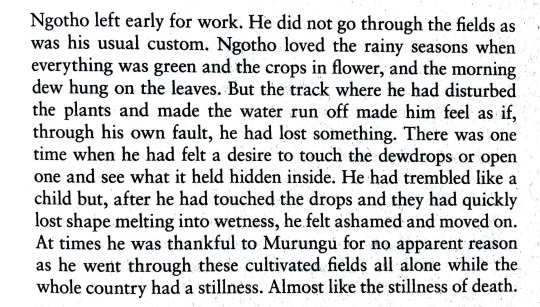
weep not, child by ngũgĩ wa thiong'o
17 notes
·
View notes
Text

just finished A Grain of Wheat by Ngũgĩ wa Thiong'o. a bit of a difficult read for me as the timeline jumps around frequently based on what new information is given to characters, etc. a lot of the time we are taken right into someones memories triggered by an upsetting event or conversation. ensemble cast. colonization as one big horrific trauma in which few participants, colonist or native, come out whole - no "perfect victims." Really hope to read some of Ngũgĩ's later works like Petals of Blood or Devil on The Cross. Maybe someday Wizard of The Crow
5 notes
·
View notes
Quote
‘Peace, God the Giver Supreme, look after those two.
When the sun becomes too hot, lead them to cool shade.
When it rains and storms, lead them to a shelter.
If they encounter a dangerous animal,
Close its eyes so it does not see them.
Remove out of their way holes, illnesses, and ogres.
Wherever they end up, they are my children.
Ngũgĩ wa Thiong’o, The Perfect Nine
3 notes
·
View notes
Text
Book 19 A Grain of Wheat
The random letter generator popped out "WA" and while Gertrude Chandler Warner's Boxcar Kids looked tempting, I instead went with Ngũgĩ wa Thiong'o 's A Grain of Wheat. I've found that books about African wars and independence can be challenging, but ultimately rewarding and so this proved to be.
The book is a look at how the Kenyan fight for independence from Brittan affected the people of one village. Many of them, including the protagonist, a hermit named Mugo, spent times in concentration camps where they were beaten and starved among other things. The reticent Mugo is asked to lead the Uhuru independence celebrations in the present, where Kenya is finally free, and to help find the traitor who betrayed their local martyr, Kihika, who was executed for assassinating a murderous British official.
Contrasted to Mugo are Gikonyo, a carpenter who was in the camps, but confessed to be released and Karanja, a collaborator who is lost with the white man pulling out of Kenya. Incidentally, while some of the writing about women felt slightly awkward, the white people felt spot on. It makes sense with Thiong'o being at Leeds University at the time he wrote it.
Incidentally, I found this was picked as one of the 70 novels for the Queen's Jubilee which seems incredible considering its depictions of the Queen are not that flattering and tells about what abominable things the British did. But I guess kudos to them for being honest about her legacy that way.
BEST LINE: "He also told them about the American War of Independence and how Abraham Lincoln had been executed by the British for leading the Black folk in America to a revolt."
SHOULD YOU READ THIS BOOK? Yes, with the warning it has some triggering elements including torture, SA, and some violence against animals. Though the book does make the point that if you can handle violence against Black people, but not animals there's something wrong.
ART PROJECT: I wanted to try all number of things for the art project, but I was worried I didn't have the knowledge to pull off anything genuinely Kenyan with the respect it deserved, so I drew some nice, safe wheat.
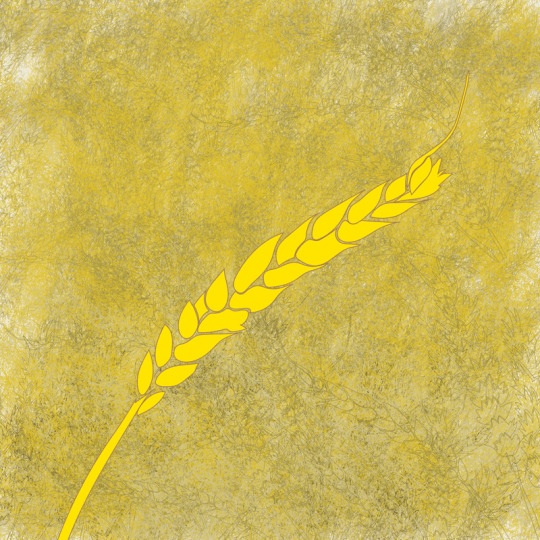
#a grain of wheat#Ngũgĩ wa Thiong'o#52books#52booksproject#kenya#kenyan independence#africa#queen elisabeth ii
5 notes
·
View notes
Text
Lillys Reading List
A few people have asked me to compile a reading list, so I'll do so now, and I'll update it whenever I need to add something:
Wretched of the Earth - Franz Fanon.
Zimbabwe Takes Back Its Land - Joseph Hanlon.
Pedagogy of the Oppressed - Paulo Freire
The Anatomy of a South African Genocide - Mohamed Adhikari.
I write what I like - Steve Biko.
Natives: Race and Class in the Ruins of Empire - Akala
A Crime Against Humanity - Analysing the Repression of the Apartheid State - Max Coleman (ed).
Battle for China's Past - Mobo Gao.
Orientalism - Edward Said
Decolonising the mind - Ngũgĩ wa Thiong'o
The Coloniser and the Colonised - Albert Memmi (currently reading).
Articles:
Revolutionaries, resistance and crisis in Zimbabwe
Robert Mugabe's Zimbabwe 30 years after independence - a class analysis
The Coca-Colonisation of Swaziland
Condescending Saviours: What went wrong with the Pol Pot regime
Youtube videos:
Civil War in the USA? A conversation with Kali Okuno on threats and Opportunities
Don't Talk to the Police
Lewis Gordon on engaging with Fanon in the time of Covid
Benefits and Costs of Creolisation as Cultural Presentation in the context of Colonisation
#newpad.txt#i will be updating this as i go along#this is a preliminary version since i get asked a lot and posting it might help me finish writing one up jdkekdk#Lillys Reading List
127 notes
·
View notes
Text
"There is no area of our lives including the very boundaries of our imagination which is not affected by the way that society is
organized, by the whole operation and machinery of power: how and by whom that power has been achieved; which class
controls and maintains it; and the ends to which the power is put. The class in power, for instance, controls not only the productive forces of the community - what is produced, how it is produced and how it is shared out - but cultural development as well. The means of life, and how they are produced, exchanged and shared out and the social institutions that the whole process gives rise to do move men, do profoundly affect the very quality of their lives: how they eat, laugh, play, woo and even make love. This universe - of moral significance of values and the quality of human life - is what imaginative literature is about. This universe is itself both a product and a reflection of the material process of living. Literature and politics are about living men, actual men and women and children, breathing, eating, crying, laughing, creating, dying, growing, men in history of which they are its products and makers.
... The relationship between the poet and politician, or between writers and politics, is particularly important in our situation
where our cultures - our literature, music, songs, dances - are developing under the strangulating embrace of western industrial and finance monopoly capital and the fierce struggles of our people for breath even. The embrace of western imperialism led by America's finance capitalism is total (economic, political, cultural): and of necessity our struggles against it must be total. Literature and writers cannot be exempted from the battlefield.
... What is important is not only the writer's honesty and faithfulness in capturing and reflecting the struggles around him, but also his attitude to those big social and political issues. It is not simply a matter of a writer's heroic stand as a social individual - though this is crucial and significant - but the attitudes and the world view embodied in his work and with which he is persuading us to identify vis-a-vis the historical drama his community is undergoing. What we are talking about is whether or not a writer's imaginative leap to grasp reality is aimed at helping in the community's struggle for a certain quality of life free from all parasitic exploitative relations - the relevance of literature in our daily struggle for the right and security to bread, shelter, clothes and song, the right of a people to the products of their own sweat. The extent to which the writer can and will help in not only explaining the world but in changing it will depend on his appreciation of the classes and values that are struggling for a new order, a new society, a more human future, and which classes and values are hindering the birth of the new and the hopeful. And of course it depends on which side he is in these class struggles of his times."
Ngũgĩ wa Thiong'o, Writers in Politics: A Re-engagement with Issues of Literature and Society (1997)
13 notes
·
View notes
Text
books I've read in 2023 so far, as of July
Den lodande människan - Patrik Svensson: loved it, could not have started my year with a better book. 5/5
Sveket - Birgitta Trotzig: became severely depressed during the three days I read this in (had to read fast for school), seriously affected my wellbeing and mental health and the way I viewed the world. when it ended it felt like waking up from a nightmare, the relief of realizing there is beauty in the world because there was none in this book. ???/5
Watership Down - Richard Adams: read swedish translation. love, just love. I found the Efrafa arc weird and misplaced in this book about rabbits though, very strange. 4/5
Heart of Darkness - Joseph Conrad: read this after I watched Apocalypse Now because I loved the film, and I think the film made me like the book more. also the first classic I read in a while and I think thats part of why I liked the writing so much. extremely racist even though its supposed to be like, anti colonial commentary? but I suppose it was in its time. 4/5
Annihilation - Jeff Vandermeer: swedish translation. I watched the movie a few years ago and ive been wanting to read this since. and im glad I did because I did like it but idk im sensing a theme here like maybe I shouldn't have read swedish translation instead of original language in some cases. cause I liked this but maybe I wouldve liked it more in english? idk.. like 3.5-4/5 though
Circe - Madeline Miller: I really liked this one. reading this in front of the fireplace, immersing myself in another world. I loved living in the Ancient Greece and greek myths for some time, I really felt I was there. I don’t know how Miller did it but she really conveyed the feeling of immortality, I really felt I was living through centuries alongside Circe and the feelings that come with that. thats why the ending was so perfect. Odysseus was the best part tho. 4.5/5
The River Between - Ngũgĩ wa Thiong'o: read up on the topic of FGM in Africa on the side as I was reading this. a very interesting and also gruesome, eye opening experience. what stays with me is the total darkness of the nights, really pierced through my soul. 4/5
Dear Edward - Ann Napolitano: swedish translation. my grandma gave this to me and told me to read it because she read it and wanted to hear what I thought, I never would have read it otherwise. it wasnt really my thing but I do like airplanes and airplane crashes as a plot, so that was the stuff I took away from the story, the rest kind of just went through me. but im kind of happy I read this book just for that reason because that part really affected me. also the conclusion was more touching than the rest of the book, which felt kinda detached. 2.5/5 for the book, 4.5/5 for airplane stuff (my post i make the rules)
1Q84 - Haruki Murakami: swedish translation (ive read all my Murakami books in swedish, since the original language isnt english and also because i like it). some parts I really really loved and were some of my fav elements of any murakami book. but this was not my favorite. overall I liked it, though. actually loved the experience of reading this because i always love reading murakami due to the meditative descriptions of daily chores combined with surrealism, and this one was extra long and repetitive so i loved that. also was interesting cause I looked up the cult events its inspired by so that was interesting too. this one had a bit more surreal/fantasy elements than his other stuff ive read I think? which was nice also. 4/5
If I had your face - Frances Cha: im glad I read it. a good insight into the reality of women in South Korea. not perfect but i feel this book succeeded in what it aimed to be. 3/5
Eileen - Ottessa Moshfegh: swedish translation. i dont really know how to feel about it, really. honestly, I dont even know what to say. this left my head kind of empty, which... may not be a good thing.. could be a poor translation, if i read another of her books ill read in english. 2.5/5
The Song of Achilles - Madeline Miller: read this hoping to get more Odysseus but there wasnt a lot. Honestly not a huge fan of this book, Circe was so much better. what rlly irked me was Miller sugarcoating some aspects of these war criminals, more specifically the rapes/sex slaves — yet keeps some things in as if they were essential. More specifically, Patroclus sleeping with that girl i cant remember the name of, for god knows what reason, it was such an unpleasant read and she had to write this so much more explicitly and drawn out than any sex scene between Patroclus and Achilles? That pissed me off and genuinely I felt it was so ugly of Patroclus because that was cheating. If it was meant to be read as asssault thats worse because that woman is literally a rape victim (of Achilles) in the canon. Very distasteful to turn a rape victim into a rapist for fanfiction fantasy. Circe was Miller’s apology to women for writing this book. 3/5
Klara and the Sun - Kazuo Ishiguro: swedish translation. My first Ishiguro. I found the conversations between characters unnatural and unempathetic, the latter especially when aimed at Klara. It is established that Klara has feelings to some degrees and yet is treated as someone who does not, and yet they characters are not supposed to be viewed as unlikeable? This threw me off and also put me off the whole book. But I really liked the character and perspective of Klara, she was my favorite part of this book. I thought it was kind of brilliant to be in Klara’s brain, but felt sorry for her due to her treatment. It frustrated me how much love and care she had for Josie and the others for almost no reason since they were never very kind or caring in turn to her or likable on their own. Her loyalty was almost pitiful, like that of an abused pet or child. The whole replacing Josie thing is so un-human I can’t even fathom these characters aren’t supposed to be viewed as something else than dystopically post-human! (Are they meant to be viewed as that? Unclear) Who could ever replace their child with a robot, an inherently selfish act, they can not possibly believe they would somehow be reviving Josie for anyone else’s sake than their own? Josie would not live on, she would still be dead. So it would be for themselves to play pretend, and it’s completely bizarre. I can’t believe this wasn’t even the moral dilemma. The whole ”something essential that can’t be replaced” is one discussion and it was handled quite weakly, but obviously even if Klara learns all there is about Josie, and is able to ”become” her, the same Josie will not have been born again to experience it. She would be a clone who ACTS like Josie, at most. She would have ”learnt all the rooms of her heart” but she wouldn’t be her, she would only copy. But no one cares about that, only whether Klara can become her clone or not. Including the father who is more critical about it seems to think it would be fine to clone his daughter and act like she is the same one, if it ever would work. could be the translator who sucks? Debating if i should read any more Ishiguro. 2/5
Lucy - Jamaica Kincaid: this is my second Kincaid, I love her writing. love it, gorgeous. she is straight forward, conveys so strongly, vividly. 4.5/5
The colorless Tsukuru Tazaki - Haruki Murakami: swedish translation. you know what, I think anyone complaining about this book should take an extra look at the cover. you’re reading murakami, this is what you get. that said, I do think this is one of his weaker attempts of his tried standard formula, ive seen him do better. I do feel like the prose was a little new, experimental maybe? Which was interesting. also not enough homoerotica. 3/5
#currently reading home by Toni Morrison almost done#my first book by her#but obviously shes a brilliant writer
12 notes
·
View notes
Note
top five essays ! i realize this is vague though so alternatively top 5 short stories <3
hi reid!! <3 okay i am going to do collections for each bc i'm bad at picking a single essay or story out of a collection!
essay collections:
hanif abdurraqib - a little devil in america
walter benjamin - illuminations
ngũgĩ wa thiong'o - decolonising the mind
julia kristeva - black sun
anne carson - eros the bittersweet
story collections:
j.d. salinger - franny and zooey (idk if this counts... the second part might be a novella? but i love it dearly!)
bora chung (trans. anton hur) - cursed bunny
angela carter - the bloody chamber and other stories
taeko kono - toddler-hunting and other stories
ryunosuke akutagawa - rashomon and seventeen other stories
(also allow me to be parasocial for a moment lol... my local bookstore had an event w bora chung and she seemed so cool, like the kind of person i would want to be friends w, kinda nervous but super smart yet humble and everything she talked about was so fascinating! i think the collection i mentioned is the only thing of hers that's been translated into english so far but i think there's gonna be another story collection coming out soonish?)
13 notes
·
View notes
Text
Ngũgĩ wa Thiong’o: three days with a giant of African literature | Ngugi wa Thiong'o | The Guardian
10 notes
·
View notes
Text

Right! I just started Wizard of the Crow by Ngũgĩ wa Thiong'o, and at about 5% I can say I'll probably love it.
I'm saying this because I love the narrator's voice - perfectly, viciously sarcastic, just the way I like it, so regardless of what the plot brings, that's a given factor of enjoyment.
Like I said I've only just stared, and we're just done setting the scene. We're in the imaginary nation of Free Republic of Aburĩria. We've been introduced to the Ruler (...and oh boy, don't we all, from post-Soviet states all the way to South America know these Beloved Leaders*), his tragic, defiant wife, fail sons and some of his worst ministers.
He just announced his next project: a new and improved Tower of Babel. Because of course.
*and even for the lucky readers with no such Beloved Leader in their nation's recent past or even present, the narrator minces no words in painting a picture of the exact sort of rat bastard that he is.
4 notes
·
View notes
Text
Favorite books I read this year (2023)
Wizard of the Crow by Ngũgĩ wa Thiong'o (magical realism, satire)
The Swarm by Frank Schätzing (science fiction)
Uzumaki by Junji Ito (manga, horror)
Jazz and Palm Wine by Emmanuel Dongala (short story collection, satire)
Under the Udala Trees by Chinelo Okparanta (queer historical fiction)
Kleine Geschichte Indonesiens by Fritz Schulze (non fiction, history)
Babel by R.F Kuang (historical fantasy)
A Blood Condition by Kayo Chingonyi (poetry)
3 notes
·
View notes
Note
book ask: 3, 11, & 13? ✨️
3 What were your top five books of the year?
One-way street, by Walter Benjamin, La Maison dans Laquelle, by Miriam Petrosyan, Les Jardins Statuaires, by Jacques Abeille, L'Oppoponax, by Monique Wittig (obligatory shoutout to @water-weaving , he of the discerning eye) and November, by Andrus Kivirahk (part of an Estonian lit kick I've been on thanks to @b-u-n-n-i )
11 What was your favorite book that has been out for a while, but you just now read?
Mmmmmm well I read very little in the way of new stuff this year, but the oldest thing I enjoyed this year was probably Liutprand of Cremona's account of him being an ambassador to Byzantium. Both a very colorful account of a lavish court and also a portrait of someone at his job hating on absolutely everyone. I cannot describe how much wrathful contempt this guy can show through plain descriptive passages, it looks like he's invented being a British writer years in advance, but no, this is a 10th century Italian diplomat/monk. Don't think I read anything older (but I should probably reread Ovid)
13 What were your least favorite books of the year?
Good question. My taste tends to be perfect and unquestionable and surefire, but sometimes I still end up mildly disappointed. Ngũgĩ Wa Thiong'o didn't live up to the hype. Neither did Emily Balistieri's translation of Tomohiko Morimi (things are dire when you end up preferring the crusty PDF of a cobbled-together fan translation over a professional job). Joel Dicker was an expected disappointment, but good fare for the genre. Ayerdhal is probably my biggest disappointment this year. Rainbow Warriors' premise is that in the 90s, a UN-supported army of LGBT soldiers overthrows an African dictatorship and sets up free elections. I thought I'd read a mordant critique of homofascism and empire, or the conflicts about being a person of color and gay in the Western world. Instead it's straight Michael from the office being the general, and his wacky gay subordinates. Very much a product of don't ask don't tell, you might say (written in 1993 I think). But the dude was a Belgian anarchist!!! I do have to question how big of an anarchist you can be if you write a colonial fantasy of ontologically good Western soldiers invading a country to "bring democracy" to Darkest Africa. In genre literature, I also found Ligotti to be mid. Good prose, but by god does the man pontify. Just send him to Avignon at this point.
3 notes
·
View notes
Text
WHO AM I (?)
HEYO! I AM:
—An aroace agender self-diagnosed autistic furry icon
—A Native American (Shoshone-Bannock Tribes)
—A voracious reader (and seldom writer)
MY CURRENT FANDOM(S):
—Loonatics Unleashed (Tech x Rev)
MY BLORBOS:
—Rev Runner (my beloved <3, Loonatics Unleashed)
—Tech E. Coyote (Loonatics Unleashed)
—Danger Duck (Loonatics Unleashed)
—Daffy Duck (literally me, Looney Tunes)
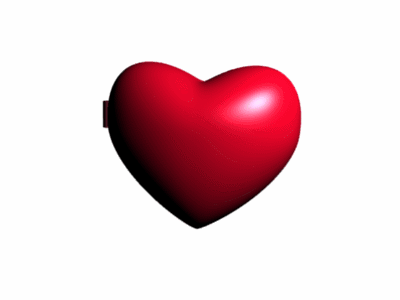
MY TOP 5 FAVORITE BOOKS:
—Invisible Man - Ralph Ellison
—The Brothers Karamazov - Fyodor Dostoyevsky
—Beloved - Toni Morrison
—A Grain of Wheat - Ngũgĩ wa Thiong'o
—Go Tell It on the Mountain - James Baldwin
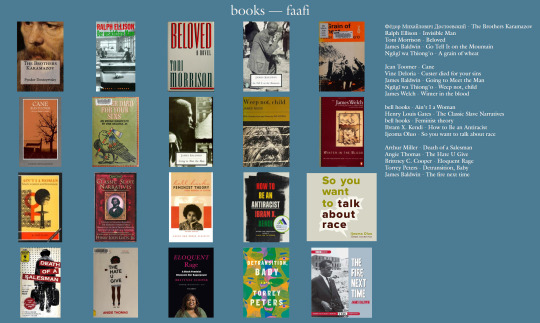
MY TOP 5 FAVORITE MOVIES:
—Moonlight
—The SpongeBob SquarePants Movie
—Come and See
—Do The Right Thing
—Yi Yi
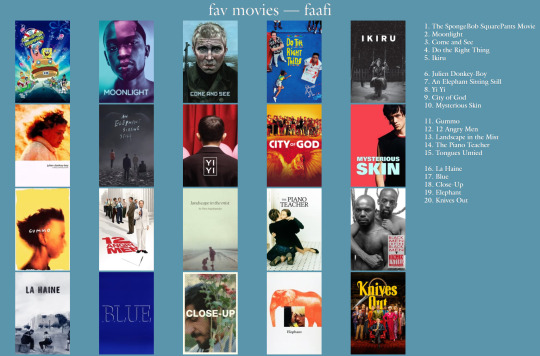
*check out the trigger warnings for each film before watching
MY TOP 10 FAVORITE ALBUMS (because 5 wasn’t enough):
—Lift Your Skinny Fists Like Antennas to Heaven! - Godspeed You! Black Emperor
—Knife Man - AJJ
—Islands - King Crimson
—Laughing Stock - Talk Talk
—Wild Is the Wind - Nina Simone
—Not Available - The Residents
—Pink Moon - Nick Drake
—Donuts - J Dilla
—SINNER GET READY - Lingua Ignota
—The Steven Wilson Remixes - Yes
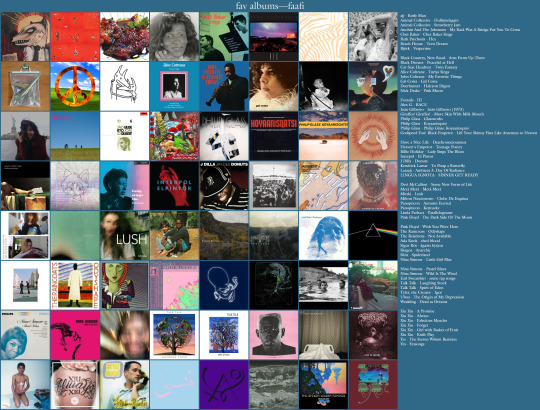
And that's (partially) me! I am looking forward to being a bozo on here :3

9 notes
·
View notes
Quote
My soul is large; it welcomes the world.
Ngũgĩ wa Thiong’o, The Perfect Nine (trans. Ngũgĩ wa Thiong’o)
#the perfect nine#ngũgĩ wa thiong'o#2018#2010s#21st century#kenyan literature#poetry#queue pierce my soul
0 notes
Text
this is literally a month late, but thanks to @iamidentical and @onmytape for tagging me in 9 people you want to know better!
favourite colour: green or purple, any shades thereof
currently reading: weep not, child by ngũgĩ wa thiong'o (i'm reading it for a class but i'm enjoying it so far! not exactly light reading tho...)
currently watching: saturday's game between the seattle thunderbirds and the wenatchee wild. (i'm actually pretty worried about what is happening with the coaching there? anyway this is not my hockey culture soapbox lmao) – shoutout to will for buying the whl subscription, ur the best <3
sweet, savoury, spicy?: all of them bc i cannot choose. on pain of death however...savoury
currently working on: my health and will to live! no but seriously i'm just attempting to stay afloat academically this semester and not get derailed by yet another illness. i jot down lyrics when i can...i really need to play my guitar more
i'm very bad at tagging people so whoever sees this: tag you're it! (also: i can't remember who tagged which blog, but @darkforestroads is my main if there's any identity confusion!)
#i love doing these but i'm very bad at remembering them#however!! thank you both for the tag!!#tag game
3 notes
·
View notes